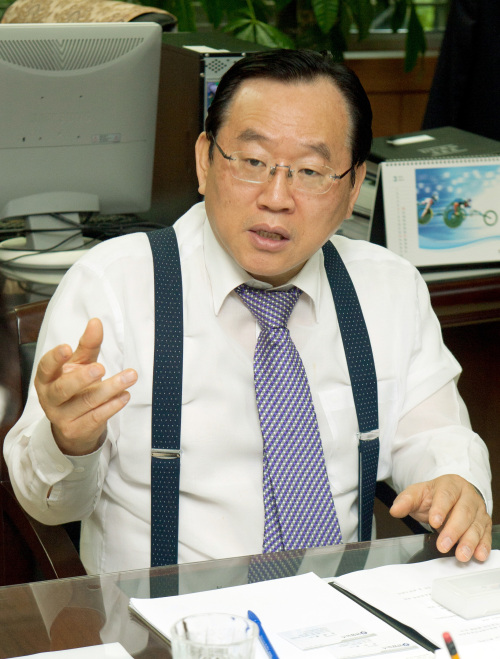When South Korea’s PyeongChang was declared the host city for the 2018 Winter Olympics last month, Yoon Seok-yong, head of Korea Sports Association for the Disabled, had mixed feelings.
By rule, an Olympic host city also runs a Paralympics in the same year, summer or winter. PyeongChang’s victory automatically made the alpine town, some 180 kilometers east of Seoul, the host for the Winter Paralympics in 2018.
 |
Yoon Seok-yong, president of Korean Paralympic Committee and Korea Sports Association for the Disabled (Yonhap News) |
Yoon, as the country’s top official for disabled sports, said he did feel somewhat left out.
“As someone who worked closely on the bid, I felt really proud and delighted,” Yoon said in an interview with Yonhap on Tuesday. He traveled to Durban, South Africa, the site of the International Olympic Committee vote on the host, as part of the bidding delegation.
“But honestly, I also felt like a poor man watching his rich older brother having a party next door,” he said.
Yoon, 59, used that analogy to illustrate the lack of support or interest in disabled sports in South Korea, in comparison to sports played by able-bodied athletes. But he said he believes PyeongChang’s hosting of the Paralympics will be a positive turning point.
“When Seoul held the Summer Olympics in 1988, it also staged the Paralympics, and that really launched disabled sports in the country,” Yoon said. Seoul was the first city to host both events.
“Now that we will have the winter version, we brought ourselves a chance to further develop winter sports for the disabled.”
Yoon, an oriental medicine doctor by trade and a legislator for the ruling Grand National Party, said he is counting on increased government support in light of PyeongChang’s successful bid. He said the government has pledged to create more semi-pro teams for disabled athletes, which in turn will help expand the talent pool for the Paralympics at home.
Yoon, himself wheelchair bound from polio, said prohibitive costs for equipment make it difficult for disable athletes to practice winter sports. South Korea has ranked consistently inside the top 20 in Summer Paralympics medal tables, but has collected just two silver medals in six Winter Paralympics so far.
But Yoon said South Korea has been making rapid progress.
“At the Torino Winter Paralympics (in 2006), we sent just three athletes, all in alpine skiing,” he said. “But last year (in Vancouver), we had 26 athletes. The world is paying attention to our fast development and they’re envious of the rate of our progress.”
Yoon said PyeongChang, during its bid campaign, earned high points for its plan for disabled athletes, especially with venues all located within 30 minutes of each other. He added South Korea will try to stage the first-ever Asian Winter Para Games, or the Winter Paralympics equivalent for Asia, in 2016 in PyeongChang.
The Asian Winter Para Games will be a good test for PyeongChang’s facilities ahead of the Winter Olympics and will also help bring together Asian disabled athletes in winter sports, he said.
“People have told us to go for it in our build-up to the 2018 Winter Paralympics,” Yoon said. “There are only a handful of countries in Asia that can host Winter Asian Games, maybe Korea, Japan, China, Mongolia or maybe Kazakhstan.”
Yoon said there is still some work left to be done for successful hosting of Winter Paralympics in PyeongChang. He recently drafted a bill that would ensure financial and administrative support for the Paralympics, laying down a legal basis for smooth and systematic preparations.
(Yonhap News)








